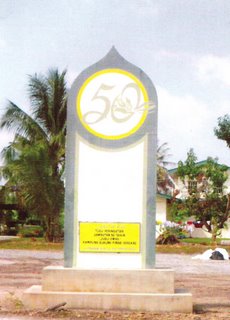The Origin of Burong Pingai
 The early Bruneians used to live on the water and most Bruneians can trace their origins there. For instance, my great grandfather used to live in Kampung Saba but when he married my great grandmother, they stayed at her village in Kampung Pandai Besi. Ask many Bruneians and their story would be more or less the same. How did I get to dry land? In my case it was my grandfather who joined the Royal Brunei Police Force and was posted to Panaga in Seria where he was a Sergeant Major when the station defended itself against the rebellion. Our family had never returned to the waters ever since my grandfather made a living on dry land.
The early Bruneians used to live on the water and most Bruneians can trace their origins there. For instance, my great grandfather used to live in Kampung Saba but when he married my great grandmother, they stayed at her village in Kampung Pandai Besi. Ask many Bruneians and their story would be more or less the same. How did I get to dry land? In my case it was my grandfather who joined the Royal Brunei Police Force and was posted to Panaga in Seria where he was a Sergeant Major when the station defended itself against the rebellion. Our family had never returned to the waters ever since my grandfather made a living on dry land.One kampung which kept their identity despite moving to dry land was Kampung Burong Pingai. I think this is the only Kampung which has both the water version Kampung Burong Pingai Ayer and the dryland version Kampung Burong Pingai Berakas. The migration took place around the mid 1950s when several families moved inland from the water village. Kampung Burong Pingai Berakas can be seen on the left hand side of the highway from the Airport. In the 1970s and 1980s, this low lying village used to suffer from frequent flash floods that the government had to build a flash control water storage. Now with the river widened, floods no longer occur.
Kampung Burong Pingai was originally named Kampung Ulu-Ulu. This is because of its location which is at the Hulu (the interior or the beginning) of the Brunei River. It became Kampung Burong Pingai when according to history, one villager (said to be a Pembalat - one who catches fish using a basket made from bamboo or makes fish traps made from bamboo) from Kampung Saba who made a living at Kampung Ulu-Ulu found a white bird making the sound 'pingai, pingai, pingai.' The man knew that the Sultan Muhammad's wife had lost the bird named Si Pingai. He caught the bird and presented it to the Sultan. Ever since then the kampung became known as Kampung Burong Pingai. Sultan Muhammad's wife was said to be a Johor Princess and this was said to be around 1368.
In 1956, the Brunei government offered to resettle Kampung Ayer villagers on dry land. The first group of villagers moved to Kampung Bunut and Kampung Burong Pingai was the second group. Each family was given one acre each to start their new life. Up to now, Kampung Burong Pingai Berakas more or less retained the families of the original settlers and numbered no more than 70 houses in total. In 2003, the Kampung celebrated its 50th Golden Jubilee to mark the 50th anniversary of Kampung Burong Pingai Berakas.


Comments
Thank you for the lovely article Mr BR.
Allow me to share an article about my late great grandpa:
http://utusanrasul.tblog.com/post/1969872279
Once again, well done Mr.BR and bless you.